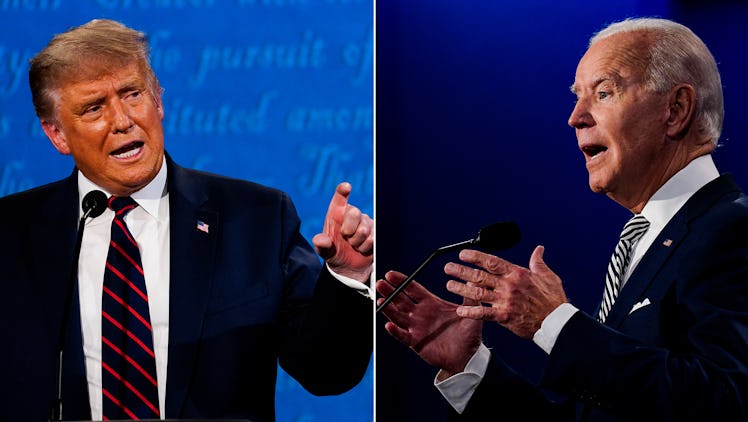
The Next Presidential Debate Will Include A Feature To Prevent Another Trainwreck
Thanks to the absolute trainwreck of a first debate between President Donald Trump and former Vice President Joe Biden on Sept. 29, America had to find out the hard way that taking turns isn't as easy as it looks (especially if you're competing for the U.S. presidency). Thanks to all of the interruptions and drama, the Commission on Presidential Debates announced on Oct. 19 that it's making a few tweaks to the next event's format — including muting candidates to prevent interruptions. While the new addition is a highly contested topic, maybe (just maybe) the Oct. 22 presidential debate's mute button can prevent another trainwreck from unfolding on stage in front of millions of viewers.
After Trump repeatedly interrupted Biden during the first presidential debate, at one point prompting the Democratic candidate to say "just shut up, man," out of visible frustration, the Debate Commission met on Oct. 19 to discuss "additional structure" to be added to the final debate and facilitate a more orderly discussion between candidates. According to an announcement later that same day from the commission, this additional structure would include turning off the candidate's microphones after their designated two minutes to speak is over to avoid interruptions — a feature that many viewers would clearly welcome in light of the many disruptions during the previous event.
The second debate, which was originally scheduled for Oct. 15, was first adjusted to a virtual event following Trump's Oct. 1 COVID-19 diagnosis, before ultimately being canceled less than a week before it took place. The commission had switched the debate to an online format "to protect the health and safety of all involved," but Trump declared that he would not participate in an online debate.
"I’m not going to waste my time on a virtual debate, that’s not what debating is all about," Trump said in an Oct. 8 interview with Fox News. "You sit behind a computer and do a debate — it’s ridiculous, and then they cut you off whenever they want," Trump added, referring to the mute button feature that's inherent in a virtual debate format. Instead, both Trump and Biden held competing (and solo) town hall events.
Now that a mute button is expected to be featured on the final presidential face-off, the Trump administration has some pointed objections to the format change. "It is our understanding," wrote Trump Campaign Manager Bill Stepien in a letter to the Debate Commission, "that you will soon be holding an internal meeting to discuss [possible] rule changes, such as granting an unnamed person the ability to shut off a candidate's microphone. It is completely unacceptable for anyone to wield such power," Stepien added. However, the Republican party candidate is still expected to participate in the event, despite what Stepien called "last-minute rule changes from the biased commission."
The Debate Commission emphasized that the format changes aren't intended to serve any candidates' interests, but to help the American people make informed decisions as they cast their ballots either on or before Nov. 3. "We are comfortable that these actions strike the right balance," the Debate Commission wrote in their announcement, per CNBC, "and that they are in the interest of the American people, for whom these debates are held."
Editor Note: A previous version of this story misstated who would control the muting of the presidential candidates. It has since been updated.